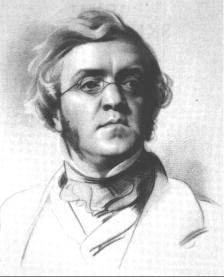
William Makepeace Thackeray (1811 - 1863)CHAPTER XXXPEG OF LIMAVADDY |
|
Between Coleraine and Derry there is a daily car
(besides one or two occasional queer-looking coaches), and I had this
vehicle, with an intelligent driver, and a horse with a hideous raw on
his shoulder, entirely to myself for the five-and-twenty miles of our
journey. The cabins of Coleraine are not parted with in a hurry, and we
crossed the bridge, and went up and down the hills of one of the
suburban streets, the Bann flowing picturesquely to out left; a large
catholic chapel, the before-mentioned cabins, and farther on, some
neat-looking houses and plantations, to our right. Then we began
ascending wide lonely hills, pools of bog shining here and there
amongst them, with birds, both black and white, both geese and crows,
on the hunt. Some of the stubble was already ploughed up, but by the
side of most cottages you saw a black potato-field that it was time to
dig now, for the weather was changing and the winds beginning to roar.
Woods, whenever we passed them, were flinging round eddies of
mustard-coloured leaves; the white trunks of lime- and ash-trees
beginning to look very bare.
Then we stopped to give the raw-backed horse water; then we trotted down a hill with a noble bleak prospect of Lough Foyle and the surrounding mountains before us, until we reached the town of Newtown Limavaddy, where the raw-backed horse was exchanged for another not much more agreeable in his appearance, though, like his comrade, not slow on the road. Newtown Limavaddy is the third town in the county of Londonderry. It comprises three well-built streets, the others are inferior; it is, however, respectably inhabited; all this may be true, as the well-informed Guide-book avers, but I am bound to say that I was thinking of something else as we drove through the town, having fallen eternally in love during the ten minutes of our stay. Yes, Peggy of Limavaddy, if Barrow and Inglis have gone
to Connemara to fall in love with Misses Flynn, let us be allowed to
come to Ulster and offer tribute or praise at your feet - at your
stockingless feet, O Margaret! Do you remember the October day ('twas
the first day of the hard weather), when the wayworn traveller entered
your inn? But the circumstances of this passion had better be
chronicled in deathless verse.
The late Mr. Pope represents Camilla as 'scouring the plain,' an absurd and useless task. Peggy's occupation with the kettle is much more simple and noble. The second line of this verse (whereof the author scorns to deny an obligation) is from the celebrated Frithhiof of Esaias Tigner. A maiden is serving warriors to drink, and is standing by a shield - 'Und die Runde des Schildes ward wie das Mägdelein roth,' - perhaps the above is the best thing in both poems. |
Back to the start
